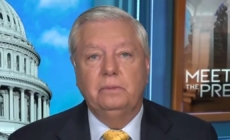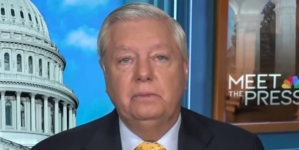-
England's Alessia Russo scores equalizer vs. Spain - 10 mins ago
-
Faraday Future unveils FX Super One EV with an AI grille that shows emotions - 13 mins ago
-
Israel announces ‘tactical pause’ in Gaza fighting after outrage over starving Palestinians - 28 mins ago
-
Almost 20 Years After Katrina, a Filmmaker Visited New Orleans. Everyone Told Her the Same Thing. - 30 mins ago
-
Ellie Goulding shares stunning bikini photos from Italian summer vacation - 34 mins ago
-
A New ‘Golden Generation’? FOX Sports Crew Discuss Spain’s Recent Dominance - 54 mins ago
-
Can a county fire a sheriff behind closed doors? Advocacy group threatens to sue for access - 56 mins ago
-
Woman Due to Give Birth on Sister’s Wedding Day, Shock at What Happens - about 1 hour ago
-
Sen. Lindsey Graham says there’s no way to for Israel to negotiate an end to the war with Hamas - about 1 hour ago
-
UEFA Women’s Euro 2025 Final: Spain-England In Blockbuster Title - 2 hours ago
Donald Trump’s Favorability Rating Falls With AAPI Adults
President Donald Trump’s favorability among Asian American, Native Hawaiian and Pacific Islander (AAPI) adults has dropped significantly over the past year, according to a new poll.
The AAPI Data/AP‑NORC poll shows that the decline appears to be driven by economic concerns, particularly around tariffs and inflation, with many respondents expressing growing unease over Trump’s policies and rhetoric.
Newsweek contacted Trump’s office via online form and AAPI Equity Alliance via email outside of usual working hours on Sunday for comment.
Andrew Harnik/Getty Images
Why It Matters
The shift signals changing political dynamics in one of the fastest-growing voter groups in the United States. The AAPI electorate has become more politically engaged in recent election cycles, and although it is not a voting bloc that has historically shown strong support for Trump, growing skepticism toward him could influence key battlegrounds in the 2026 midterms and beyond.
As reported by the Associated Press, the poll is part of an ongoing project aimed at examining the perspectives of Asian Americans, Native Hawaiians and Pacific Islanders—a demographic often underrepresented in national surveys because of limited sample sizes and insufficient linguistic accessibility.
The data highlights how economic anxiety and policy perceptions are shaping voter attitudes among these traditionally underrepresented communities.
What to Know
The national poll, conducted from June 3 to 11, 2025, surveyed 1,130 AAPI adults and found that 71 percent now hold an unfavorable opinion of Trump, up from 60 percent in December 2024.
The unfavorability spike is particularly pronounced among AAPI independents, where there has been a nearly 20-point increase this year.
Economic concerns appear to be a major factor. About 80 percent of AAPI adults believe Trump’s proposed tariff policies would raise consumer prices. Only 40 percent expect positive outcomes like increased U.S. manufacturing, and just 20 percent anticipate job growth.
A significant 65 percent of respondents say they are “extremely” or “very” worried about the possibility of a recession, compared to a national average of 53 percent who said the same in an April AP-NORC survey, the Associated Press reported.
The latest poll was conducted amid Trump’s recurring threats to impose new tariffs, which he says are intended to address the nation’s trade imbalance.
In June, inflation rose to its highest level since February, with Trump’s tariff policies contributing to increased prices om everyday items, including groceries and household appliances.
What People Are Saying
Michael Ida, a 56‑year‑old teacher from Hawaii, said, as reported by the Associated Press: “Here in Hawaii, because we’re so isolated, everything comes on a ship or a plane. We’re especially vulnerable to prices rising and disruptions in the supply chain. There’s definitely some anxiety there.”
Shopan Hafiz, a 39‑year‑old engineer from Oregon, voiced concerns over tariffs, as reported by the Associated Press: “With all the tariffs, I don’t think it’s going to help. All the tariffs will ultimately be paid by U.S. nationals, and inflation is going to get worse.”
Hafiz’s decision to vote for Libertarian Party nominee Chase Oliver last year was in part in opposition to the two major U.S. parties’ support for Israel in its war in Gaza, which has so far killed over 56,000 Palestinians following Hamas’ October 7, 2023 attack on Israel that killed some 1,200 people and led to some 250 being captured and held in captivity.
Karthick Ramakrishnan, executive director of AAPI Data, said, referring to AAPI voters, as per Associated Press: “They are not seeing big economic benefits pan out. Quite the contrary—they’re seeing big economic risks on the horizon based on Trump’s actions on tariffs.”
What Happens Next
With AAPI communities making up about 7 percent of the U.S. population—and growing fastest in several key swing states—these changing views could play a significant role in shaping electoral strategies for the Republican and Democratic parties.
Analysts expect further polling, increased multilingual outreach, and renewed focus on economic messaging in AAPI engagement efforts ahead of the 2026 midterms and 2028 presidential race.
Source link































